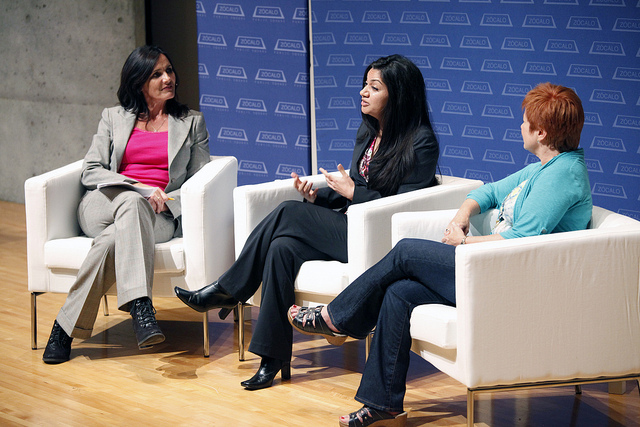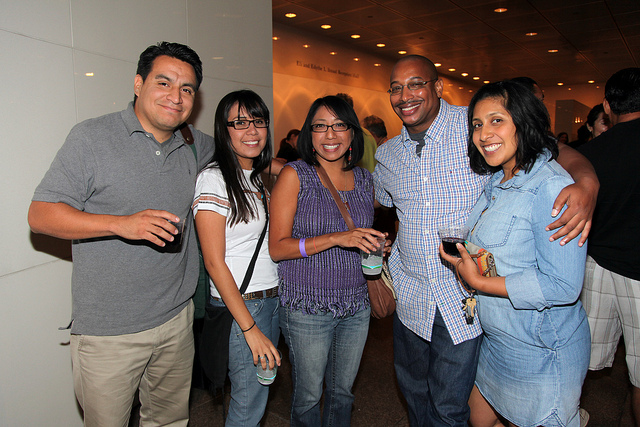
Studies show that happier, more optimistic people live longer, perform better in work and school, and lead healthier lives than their unhappy, pessimistic counterparts. But what can we do in our everyday lives to make ourselves both happier and healthier? At an event co-presented by Kaiser Permanente at MOCA Grand Avenue, “The Happiness Psychiatrist” Sheenie Ambardar—a physician who combines both Eastern and Western philosophies in her practice—and life coach Cynthia Loy Darst talked with Southern California Public Radio healthcare reporter Stephanie O’Neill, the evening’s moderator, about why it’s good to be happy, and how happiness can be achieved.
“How do you create happiness?” O’Neill asked the panelists.
Ambardar said for her, being happy is feeling contented and at peace—but it’s different for everyone. What we all have in common is that we need courage and confidence to know what makes us happy rather than what society thinks should make us happy.
Darst agreed, adding that many people enter counseling thinking that happiness comes from accomplishment—reaching a certain weight or writing a book or finding a partner. “We tend to think that the circumstances are going to have us be happy,” she said. But “they don’t provide long-term happiness.”
Ambardar said that often the striving and struggle bring happiness rather than reaching the end, and so it’s natural to start looking for the next goal as soon as we’ve reached one.
So, asked O’Neill, how can we stay happy in a particular moment even if we’re not achieving or even moving toward a goal? What’s the trick to feeling at peace when you’re sitting in traffic and running late?
It’s about where you choose to put your focus, said Darst. It’s true that stress captivates you in the moment, but at a certain point staying in that moment and experiencing that drama becomes a choice—and you have the option of focusing on something else instead.
When O’Neill brought up the topic of whether many of us might be predisposed biologically to being happy or sad, Ambardar noted that it’s true that some people are naturally more ebullient than others. But our innate biological predisposition is only half of the equation at maximum. How we’re raised is also part of it. “You still have a lot in your own control,” she said. There are concrete ways of thinking—and thoughts that can be avoided—that can make you happier.
Focusing less on money is part of it, she noted. At a certain point, money doesn’t make you happier, even if it makes you more comfortable. Avoiding bad relationships as well as situations where you are putting other people ahead of yourself also helps.
Of course, there’s also a time for being unhappy. Darst said that taking the time to honor grief and loss is essential. But these feelings can sometimes even provide opportunities to see what makes you happy. “The danger for me is often when people try to move too quickly” past sadness, she said.
Happiness is a path that takes a lot of work, added Ambardar. It’s not going to fall on you; you have to work toward it. You also need to find your passion—and understand that it’s OK not to know where your passion is and to keep searching for it.
Darst said that sometimes it takes stepping even farther back and asking yourself how you know you’re happy and how best you can measure this feeling. It’s not about starting with the thing that makes you passionate but with how you feel when you’re passionate about something.
You have to be open to the signals the world is giving you, said Ambardar—to keep an open mind, to read, and to explore. But that openness requires a certain confidence, too.
Ambardar is also a “big proponent of meditation” as a way of becoming happier and more at peace. O’Neill pointed to a recent UCLA study that showed that caregivers to Alzheimer’s patients who meditated were better able to cope with stress than those who didn’t meditate.
In the question-and-answer session, audience members asked the panel if there’s anything about the “pursuit of happiness” that’s particularly American—and if American ideas of happiness differ from those of people in other countries.
Ambardar thinks it’s ironic that happiness is written into our constitution when we don’t talk or think about it on a regular basis—and when we’re so concerned about pursuing other things, like wealth.
Darst said that she’s found that people in other cultures have different ideas about what’s important to them, and what fulfillment means. And it’s true that in certain cultures, people can’t even afford to have this sort of discussion about happiness. Yet even if they’re not happy with their circumstances, they are able to find happiness regardless.






Send A Letter To the Editors